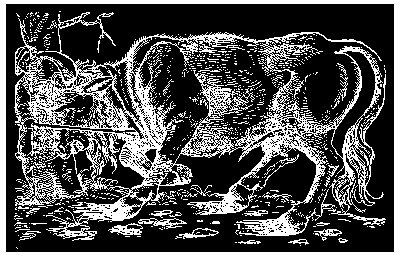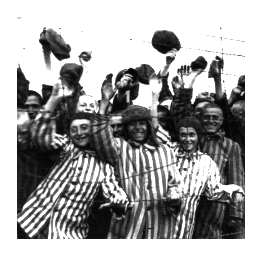Raising
Beef Cattle
Heather Smith Thomas
(Storey)

Seems that this big guy named Murray Grey meets a Ms. Charolais for what looks like fun and games in the country, but turns out to be a "fatal attraction."
At first they cavort with the flowers, but then comes the ominous Mr. Breeder who seems to have other ideas for them. Although she is the original innocent lamb, so to speak, Charolais keeps running into dangerous strangers, with even stranger names: The Bloat, Hardware Disease, Footrot, Lump Jaw, and the worst of the bunch --- the foreigner named Calculi. Even though it seems pastoral, it's an animal world out there, especially when Murray Gray is corralled and, ug, castrated by the Elastrotor Ring Gang.
Charolais is beside herself, and in her grief, gives birth to a twenty-five pound male who they immediately name "Red" --- Red Angus, for short.
Well, Red grows up --- rather quickly (800 pounds in a year!) --- and vows vengeance for the indignity visited on Murray Gray. Taking the bull by the horns, he goes after Mr. Breeder, but learns to his amazement that Breeder is his uncle (he finds this out when Big Red steps on his foot, and the old stud yells "Uncle.) Joining forces, they fend off Lump Jaw and Calculi, finally eliminating the entire Elastrotor Ring. The last scene is one of the whole family, riding off, into the sunset, singing "Cow-cow Boogie."
Warning: There is some bull here, but mostly, the Gray family --- and probably you --- will end up well contented.
According
To The Son
Norman Mailer
(Random House)
Well, we have to give him an "A" for effort --- or perhaps, a "G" for Guts. And what he makes is worthy of being called novel: that is, it's a story that has plot, and moves right along. It's the tale of a man who is caught up in a destiny he certainly didn't create (except that he did, being one-third of the trinity) and he doesn't care for.
Mailer paints him as troubled, and humble --- what Joyce called "a joiner." He's uneasy with his mission, he certainly is drained by the miracles he must perform to get people to pay attention. He is harried by the crowds who won't leave him alone, demanding yet other miracles --- and, he is alternately loving of, and irritated by, his disciples, and how they would man-handle his words:
- Later, those who became my scribes, and most notably Matthew, in his gospel, would speak of my Sermon on the Mount. They had me saying all manner of things, and some were the opposite of others. Matthew put so many sayings together, indeed, that he might as well have had me not ceasing to speak for a day and a night, and speaking out of two mouths that did not listen to each other.
Mailer runs into the same paradox that haunted so many of those who tried to bring Jesus to life: how can one write about a saint without the words turning bland and dull. Great good usually doesn't work on the page. It was the same problem Milton struggled with: the evil ones come off far more interesting. When Jesus meets the devil in the desert, it's love:
- He had a gold ornament on a gold chain about his neck, and in this ornament was the face of a ram, bestial yet more noble than any ram I had ever seen. And the hair of this prince was as long as my own and lustrous. He was dressed in robes of velvet that were as purple as the late evening, and he wore a crown as golden as the sun. He had climbed the mountain, yet there was no dust on his robes nor sweat on his skin. He could be no other than who I thought, and indeed he soon introduced himself. I said to myself, "The Devil is the most beautiful creature God ever made."
And of all the disciples, it is Judas that comes to life ("His eyes were too full of fire. Indeed, I felt blinded by the blaze of his spirit.") In dialogue, he speaks as a cynic, but with such an honesty that Jesus finds himself refreshed. The merchants will never be able to be at one with him, says Judas, because "Gold is the center of philosophy for such a person, and salvation is there to contemplate in one's thoughts, but not in one's action." Jesus says, as he said of the Devil, "I loved Judas. In this hour I loved him more even than I loved Peter." And as with the Devil, it's the complexity of character that gives him his life on the page, and our interest.
It is, as we say, a daring, and sometimes beautiful, piece of work. For the early Christians, the poor were it; and there's a Marxist touch to Judas when he claims that if Jesus ceased to labor for the poor, "I would turn against you. A man who is ready to walk away from the poor by a little is soon ready to depart from them by a lot." This book assures us that Jesus knew that the rich would, sooner or later, figure out some way to pervert what we now call "Christianity." Mailer (definitely) and Jesus (probably) thus place those dreadful TV evangelists, with their endlessly scrolling 800 numbers, just a bit below Judas.
April 1945
The Rainbow
Liberation
Memoirs
Sam Dann, Editor
(Texas Tech)
We always want to tell you about books you want to buy and read. We also want to tell you about books you don't want to buy and read. Badly written books. Badly conceived books. Or books that are just so sad, you don't want to get involved.
Dachau may be one you want to avoid. It consists of official reports, personal letters, news reports, and recollections --- from many years later --- of the soldiers who liberated Dachau. (The 42nd Rainbow Infantry Division was the one that arrived first.)
If the letters aren't enough, there are the pictures that the official Army photographers took. I was going to count them just now, but I don't think I will. Fortunately, the cover and the first photograph show dozens of exaulting ex-prisoners, at the brink of their liberation.
 Even now, over fifty years later, one can't help but feeling a bitter, violent anger at a country --- the country of Bach and Brahms and Schubert --- a country that could engender such a bestiality. One still feels, even now, perhaps forever, a bitterness at the Germans, the Germans who did it, and the Germans who lived in the nearby town and said, no, of course --- we didn't know what was going on; and the Germans, even now, who are trying to pretend that it never happened.
Even now, over fifty years later, one can't help but feeling a bitter, violent anger at a country --- the country of Bach and Brahms and Schubert --- a country that could engender such a bestiality. One still feels, even now, perhaps forever, a bitterness at the Germans, the Germans who did it, and the Germans who lived in the nearby town and said, no, of course --- we didn't know what was going on; and the Germans, even now, who are trying to pretend that it never happened.